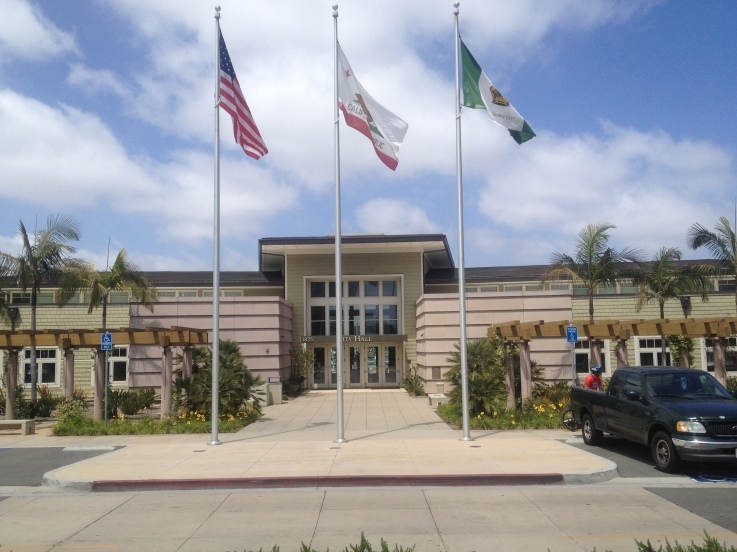 The Coronado City Council adopted a medical marijuana ordinance similar to the one it passed three weeks ago that banned the cultivation, distribution and delivery of the drug; but added additional language specifying that it was the “intent of the city not to prohibit the delivery or transport of medical marijuana to qualified patients provided that the delivery or transport is unrelated to any commercial cannabis activities.”
The Coronado City Council adopted a medical marijuana ordinance similar to the one it passed three weeks ago that banned the cultivation, distribution and delivery of the drug; but added additional language specifying that it was the “intent of the city not to prohibit the delivery or transport of medical marijuana to qualified patients provided that the delivery or transport is unrelated to any commercial cannabis activities.”
It also stipulated that the ordinance come back to the council one month after the state agency responsible for regulating medical marijuana issues its rules. These are expected January 1, 2018.
The vote was unanimous. Councilman Richard Bailey, who opposed the original ordinance, not only supported the ordinance this time around, he seconded the motion proffered by Councilwoman Carrie Downey.
Although Downey supported the revisions, she still contends that the additional language doesn’t change anything and more importantly, makes the city vulnerable to litigation.
The original ordinance banned the commercial delivery of marijuana, but did not prevent cooperatives and caregivers who deliver the drug to patients with a medical marijuana card. Although it didn’t say so explicitly, many people assumed medical marijuana deliveries would stop. It would not have done that.
The ordinance was based on recommendations from the League of California Cities and most cities in the State are following the League’s advice.
Doing so, Downey said, indemnifies cities from lawsuits, because if all the ordinances are the same, one city can’t be targeted. “They can’t sue all of us,” Downey said.
Others felt clarifying language was important to reassure residents who relied on medical marijuana deliveries.
“I don’t mind taking one for the team and I’m not concerned about being thrown under the bus,” Councilman Bill Sandke said.
“The last time the council voted, it tried to take the most logical approach,” Mayor Casey Tanaka said. “We’ve heard a lot of feedback since then that has caused me many moments of pause.”
After the original ordinance passed, numerous people contacted council members directly or commented on social and news media. Many relied on medical marijuana deliveries or had family members who did.
“If this affects one person who’s ill and elderly, then it is the wrong thing to do,” said Jenny Eidman. Her father died of brain cancer in 2013 and used medical marijuana to alleviate his suffering.
Currently all deliveries are made by dispensaries, only to designated people with medical marijuana cards. They are allowed to deliver eight ounces to five individuals.
“Nothing we do today will change that,” Downey said.
Things will change when Medical Marijuana Regulation and Safety Act signed into law by Governor Jerry Brown in October is fully implemented. It created the Bureau of Medical Marijuana Regulation (BMMR) to establish rules for medical marijuana cultivation and distribution.
The law also allows communities to establish their own regulations, but they must have an ordinance in place by March in order to do so.
For that reason the city council did not consider a third option to establish delivery rules. Police Chief Jon Froomin had suggested regulations that CPD would like to see in delivery regulations, such as restricting delivery times (7am to 7pm), prohibiting advertising on delivery vans, and keeping a log of deliveries.
He also said that the police department wasn’t aware of any criminal activity associated with medical marijuana deliveries in Coronado.
Because there haven’t been any problems here, the council decided to leave this open until it saw what the state did. It also wanted to make sure the public had a full understanding of state rules and to have a say on how they are implemented in Coronado.
Much of the confusion over the issue arose because the law created “a business model for delivery medical marijuana that doesn’t exist,” City Manager Blair King explained. He added that he suspected the new agency was being set up in anticipation of the legalization of recreational marijuana and will operate the same way the Alcohol Beverage Commission does. While it remains a federal crime, many states have already legalized the drug. California, who adopted the first medical marijuana act, is expected to join them.
For now, the rules at the state and local level only apply to medical marijuana, as does the city’s new ordinance. Unfortunately it was adopted without a full discussion and without making it clear to the public what was intended. On Tuesday the Council took the opportunity at the second reading to clarify the issue for itself and the public.
“This has been a learning opportunity for all us,” said Bailey.
In other action: The city council appointed Lori Luhnow and Howard Somers to the Transportation Commission. It awarded contracts for the Adults with Disability Act (improvements) and Parking Lot Project at the Coronado Cays Fire Station and for bulb-outs at Second Street and Orange Avenue.
Because of the time spent discussing the medical marijuana ordinance, the Council continued a discussion about a crafting a memorial/donation policy and approval of a donation fee schedule for a donor wall at the John D. Spreckels Center and Bowling Green to its January 19 meeting.




